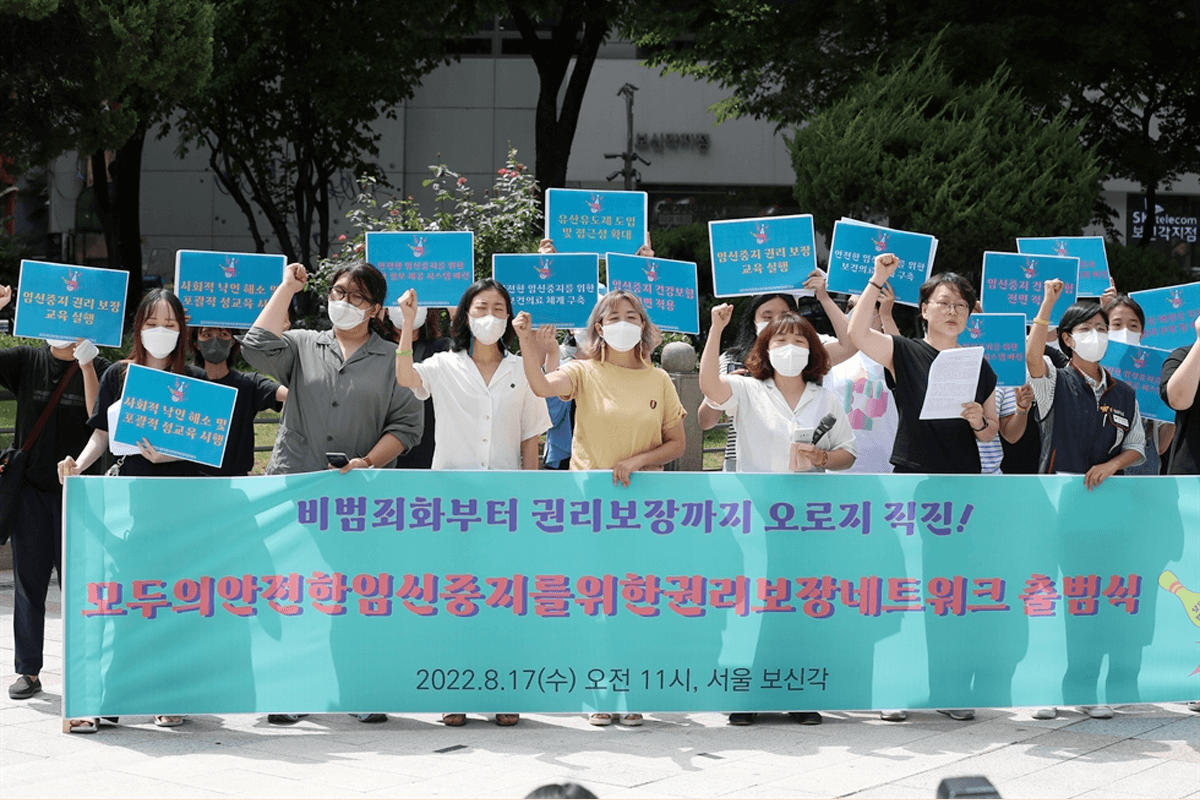
Photo: Joint Action for Reproductive Justice held a rally calling for the complete decriminalisation of abortion in central Seoul, 17 August 2022. Newsis
The news from South Korea about abortion is ambivalent. Abortion was decriminalised in 2019, but it was not legalised. In April 2019, South Korea’s Constitutional Court had ruled that making abortion a criminal offence was unconstitutional and ordered the legislature to revise the laws by the end of 2020. The judges said women and girls should have up to 22 weeks into their pregnancy to allow “sufficient time to make and carry out a holistic decision”.
The case that compelled the court to act was part of a years-long effort by a broad coalition including feminists, healthcare providers, disability rights advocates, lawyers, youth activists, and religious groups. The group sought and obtained broad support for reform, in the form of amicus (friend of the court) briefs supporting the case, including one from a government ministry. Human Rights Watch also weighed in.
In 2020, the government proposed legislation that would have partially reformed the law, but the National Assembly did not act. On 1 January 2021, under the terms of the court order, abortion was officially decriminalised. Still, it is a confusing situation, as there is little clarity on how, when, or where an abortion can be obtained.
An article in the International Journal of Gynecology & Obstetrics published in 2023, though based on only a few interviews, found that while informal access to surgical abortion services was possible in general, it remained stigmatised. Moreover, accessibility to services and information varied according to women’s age, marital status, and physical condition. The government has been “reluctant to adopt proactive measures to ensure access to abortion services, so the quality of abortion care in Korea remains questionable, with the mandate of male consent for abortion still prevailing. The women interviewed in this study expressed dissatisfaction with the current access to and quality of abortion services”.
One article described the situation as a “legal grey area”, since according to government data, only about 3,000 “legal” surgical abortions are performed every year, but the total number of abortions is presumed to be much higher. In October 2020, the Ministry of Justice sought to revise the Criminal Law and the Mother and Child Health Law to decriminalise abortions performed within the first 14 weeks of pregnancy. It also sought to include exceptions to allow the procedure up to 24 weeks in certain situations, including when the pregnancy is the result of rape. But the revision bills failed to pass the National Assembly.
According to attorney Lee Eun-eui: “In the current situation where the anti-abortion law has been nullified and no laws were enacted to replace it, there are technically no restrictions on abortion. But this doesn’t mean that abortion has become completely legal.”
“It means that some abortions are still performed covertly due to the government’s lack of willingness to address the issue,” said Na Young, head of Joint Action for Reproductive Justice, a coalition of pro-choice activists. “When women call hospitals asking whether they offer surgical abortion, the hospitals in most cases don’t give a straightforward answer because they are not sure whether it’s legal or not. Due to the absence of a platform providing information about which clinics offer the surgery and with no health insurance coverage, women rely on internet communities to get information and have to pay from their own pockets for the costly surgeries.” She called for swift the government action in better guaranteeing women’s rights by creating a platform where women can find health practitioners willing to offer the service, giving the example of a website operated by the Health Ministry of New Zealand.
SOURCES: Human Rights Watch, by Lina Yoon, 9 June 2022 ; The Korea Times, by Lee Hyo-jin, 27 November 2022 [or August 2023, unclear].



